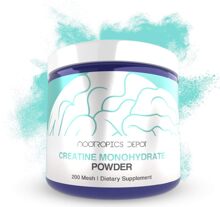
Nootropics Depot Creatine Monohydrate
Go to Store
Nootropics Depot Creatine Monohydrate
Go to StoreWhat is Creatine?
Identified in 1832 when Michel Eugène Chevreul isolated it from the basified water-extract of skeletal muscle, Creatine is a nitrogenous organic acid that occurs naturally in vertebrates. It is primarily synthesized in the liver and kidneys. Named after the Greek word for meat (kreas), Creatine helps to supply energy to all cells in the body, but most notably muscle cells. This is achieved by increasing the formation of adenosine triphosphate (ATP), which is essential in the process of sending energy directly to our muscles. In fact, it is estimated that 95% of Creatine is stored inside our muscles. The remaining 5% is found in our brain, kidneys and liver.
Creatine Structure
While Creatine is naturally produced by the body from the amino acids glycine, arginine, and methionine as well as found in foods such as red meat and some fish, taking a Creatine supplement has remained popular among bodybuilders and athletes due to its well-documented ability to support muscle growth and increase strength.
What Does Creatine Do?
When a Creatine supplement is taken, it is believed to increase phosphocreatine. Phosphocreatine is essentially "stored energy" and it primarily works to replenish ATP (adenosine triphosphate). Adenosine triphosphate is what is believed to support physical energy and recovery. In other words, when our body is depleted of its Creatine supply, so to is our high-intensity energy and our muscle's ability to produce force (or in a bodybuilder's case, continued repetition of weight being lifted). In theory, a Creatine supplement is intended to increase exercise performance by converting adenosine diphosphate (ADP), a by-product of physical exercise, to Adenosine triphosphate (ATP) through the donation of phosphate groups.
Creatine Benefits and Uses
Due to its popularity, Creatine is one of the most commonly researched dietary supplements available. In fact, despite the number of myths surrounding Creatine supplements, it is estimated that more than 500 research studies exist regarding its effectiveness and safety alone. Notable Creatine benefits and uses may include:
- Promote creation of ATP energy (adenosine triphosphate)
- Support a healthy metabolism
- Support healthy brain function
- Support healthy energy levels
Is Creatine a Nootropic?
While Creatine is most well known as a workout supplement, some early evidence suggests that Creatine may be a natural nootropic. In the same way that Creatine may store energy in our muscles, it may store energy in our brains and increase mental endurance without the crash of popular stimulants like caffeine.
- Creatine may be neuroprotective: Considered a seconday effect thanks to increased ATP production, Creatine may attenuate neuron death and preserve standard growth rate of neurons.
- Creatine may reduce brain fatigue: Because Creatine helps us recharge ATP, which provides energy to our brain cells, it may reduce brain fatigue.
- Creatine may promote neurogenesis: Creatine may promote synaptic neurogenesis due to its in vitro ability to promote mitochondrial function.Mitochondrial function is believed to promote neuronal growth.
- Creatine may support brain health: Because Creatine has the ability to preserve ATP, Creatine supplementation may preserve mitochondrial membrane permeability.
- Creatine may support memory and learning: While Creatine likely has limited potential as a nootropic in young, healthy omnivores; Creatine supplementation has been shown to promote cognitive function in people with no daily creatine intake such as vegetarians and vegans. Not surprisingly, this is likely due to a creatine deficiency. Some early research also suggests that ATP re-synthesis may support short-term memory. Additionally, one rat study noted the enhancement of spatial learning from a previous stimuli, believed to be mediated via the NMDA receptor.
How to Take Creatine Monohydrate
As a dietary supplement, take 5000mg of Creatine Monohydrate once daily.
The Best Time to Take Creatine
The question of whether Creatine should be taken before or after a workout is often raised. While Creatine has primarily been promoted as a preworkout supplement, some very early evidence suggests that when to take creatine may be best after a workout. In a recently published paper titled "The Effects of Pre Versus Post Workout Supplementation of Creatine Monohydrate on Body Composition and Strength," 19 participants took a Creatine supplement before or after a workout. Every participant that took 5000mg of Creatine as a post workout supplement demonstrated marked improvements, though it was noted that the added benefits were small.
As it stands, to obtain the benefits of Creatine it is still believed that what is most important is its accumulation in the body rather than when the best time to take Creatine is.
Is Creatine Monohydrate Instant the Best Creatine to Buy?
This particular form of Creatine is Creatine Monohydrate Instant, which dissolves almost instantly in water, makes it ideal for fast delivery and high bioavailability. Though it is slightly more expensive, Creatine Instant is considered three times more water soluble than regular Creatine Monohydrate 200 mesh.
Where to Buy Creatine
Nootropics Depot offers a 500g jar of high quality Creatine Monohydrate Instant Powder. Nootropics Depot's Creatine Monohydrate Instanthas been lab-tested and verified for both product purity and identity.
To gain more insight, read the Creatine reviews and experiences below.
IUPAC: 2-[Carbamimidoyl(methyl)amino]acetic acid
CAS: 57-00-1
Attention: This product is not intended to diagnose, treat, cure, or prevent any disease. It has not been approved, nor have these statements been evaluated, by the FDA.
Sources:
- https://en.wikipedia.org/wiki/Creatine
- https://examine.com/supplements/creatine/
- https://www.ncbi.nlm.nih.gov/pubmed/23919405
- https://www.healthline.com/nutrition/10-benefits-of-creatine#section1
- https://www.healthline.com/nutrition/what-is-creatine#section1



